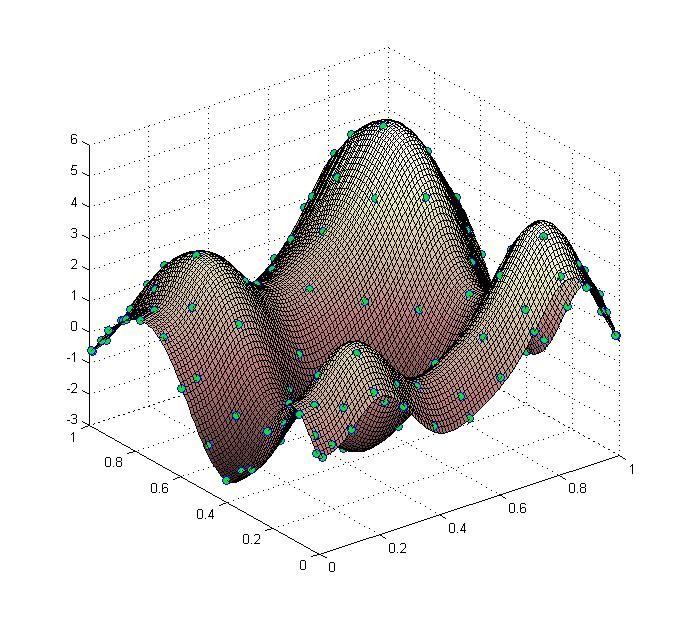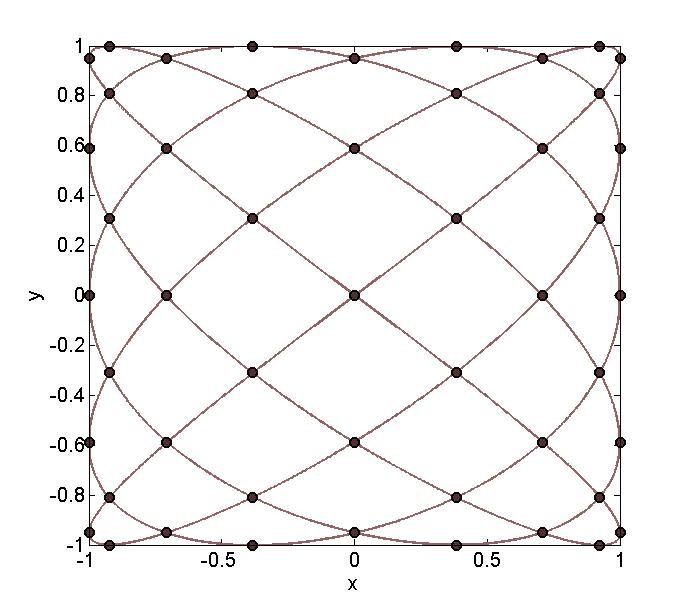Version: 0.2 (01.05.2016)
Written by Wolfgang Erb
The package LS2Ditp contains a Matlab implementation for bivariate polynomial interpolation on the node points LS of degenerate and non-degenerate 2D-Lissajous curves. The description of the Lissajous curves, the point sets LS and the polynomial interpolation scheme is summarized in the survey article [3].
The main test file for interpolation is main_example.m
For plotting 2D Lissajous curves and the LS points use plot_Lissajous.m
The following people contributed to the development and the theory of this code:
- Wolfgang Erb (Institute of Mathematics, University of Luebeck) in [1,2,3,5]
- Christian Kaethner (Institute of Medical Engineering, University of Luebeck) in [1,3]
- Mandy Ahlborg (Institute of Medical Engineering, University of Luebeck) in [1,3]
- Thorsten M. Buzug (Institute of Medical Engineering, University of Luebeck) in [1]
- Peter Dencker (Institute of Mathematics, University of Luebeck) in [3,5]
For non-degenerate Lissajous curves, the theory and the interpolation scheme were developed in:
- [1] Erb, W., Kaethner, C., Ahlborg, M. and Buzug, T.M.
Bivariate Lagrange interpolation at the node points of non-degenerate Lissajous curves
Numer. Math. 133, 4 (2016), 685-705
For degenerate Lissajous curves, the respective results can be found in:
- [2] Erb, W.
Bivariate Lagrange interpolation at the node points of Lissajous curves - the degenerate case
Appl. Math. Comput. 289 (2016), 409-425
The results of these two papers are summarized in:
- [3] Erb, W., Kaethner, C., Dencker, P., and Ahlborg, M.
A survey on bivariate Lagrange interpolation on Lissajous nodes
Dolomites Research Notes on Approximation 8 (Special issue) (2015), 23-36
In the implementation, we follow the notation given in [3].
For an application of this code in Magnetic Particle Imaging, see
- [4] Kaethner, C., Erb, W., Ahlborg, M., Szwargulski, P., Knopp, T. and Buzug, T. M.
Non-Equispaced System Matrix Acquisition for Magnetic Particle Imaging based on Lissajous Node Points
IEEE Transactions on Medical Imaging (2016), in press, DOI: 10.1109/TMI.2016.2580458
For an extension of the theory to the general multidimensional case see
- [5] Dencker, P. and Erb, W.
Multivariate polynomial interpolation on Lissajous-Chebyshev nodes
arXiv:1511.04564v1 [math.NA] (2015)
For degenerate 2D-Lissajous curves and the parameters n = (k,k+1), n = (k+1,k) the implemented interpolation points are exactly the Padua points, see
-
[6] Bos, L., Caliari, M., De Marchi, S., Vianello, M. and Xu, Y.
Bivariate Lagrange interpolation at the Padua points: the generating curve approach
J. Approx. Theory 143 (2006), 15--25 -
[7] Caliari, M., De Marchi, S. and Vianello, M.
Algorithm 886: Padua2D: Lagrange Interpolation at Padua Points on Bivariate Domains
ACM Trans. Math. Software 35-3 (2008)
Copyright (C) 2016 Wolfgang Erb
This software was written by Wolfgang Erb and developed at the University of Luebeck.
LS2Ditp is free software: you can redistribute it and/or modify it under the terms of the GNU General Public License as published by the Free Software Foundation, either version 3 of the License, or (at your option) any later version.
This program is distributed in the hope that it will be useful, but WITHOUT ANY WARRANTY; without even the implied warranty of MERCHANTABILITY or FITNESS FOR A PARTICULAR PURPOSE. See the GNU General Public License for more details.
You should have received a copy of the GNU General Public License along with this program. If not, see http://www.gnu.org/licenses/.

